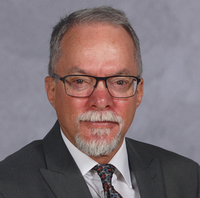Dan Nolan retires as Monmouth College sports information director after 21 years
Monmouth, Ill. (12/22/2020) — Anyone familiar with Monmouth College Sports Information Director Dan Nolan knows that the veteran local sports personality dishes out humor directed at others but also points a fair share of it at himself.
"When I started here, I had dark hair and was 6-foot-4," said Nolan, who is retiring from Monmouth at the end of December after more than 20 years telling the Fighting Scots' stories.
The topic of growth - or lack thereof - is a favorite talking point when trading barbs with Nolan. But make no mistake: he helped oversee a boom time of growth for Fighting Scots athletics in the first two decades of the 21st century, all the while navigating that new terrain with a sterling work ethic and tireless personal attention to detail and professionalism.
When Nolan came to Monmouth College in 1999 after 12 years as sports director in local radio, Monmouth had 14 sports, and he shared SID duties with a colleague. By the end of his tenure, Nolan was a one-man SID department and Monmouth was up to 24 sports.
"The (athletics) website, when I started, was in its infancy, to put the best positive spin on it," said Nolan. "We were just getting into that part of it. It's grown so much."
Nolan's command of the website as well as the College's 24 varsity sports has impressed those who have worked closest with him.
"Dan has done an excellent job providing our constituents with timely information about Monmouth College athletics during his career," said Director of Athletics Roger Haynes. "The average student-athlete or fan simply doesn't understand the many hats that Dan had to wear on a daily basis. His ability to work closely with all the head coaches and 24 varsity sports takes a great deal of discipline."
Nolan last posted an official Fighting Scots result on March 13, but he remained active during the COVID-19 pandemic by covering such stories as new coaching hires, off-season contact days, inspiring student-athletes and training issues related to new COVID-19 protocols.
Nolan would be the first to say he didn't work alone, crediting the cast of talented student workers he assembled over the past two decades. Those extra hands became even more of a necessity as his job description grew to producing live video feeds and broadcasts, and as the rise of the internet and social media increased the number of platforms where scores were reported.
"I can't say enough about the student workers," said Nolan. "Without my student workers, I wouldn't have lasted this long. We've had so many great ones. It's made my job a lot easier, because we have more things to do, like our livestream webcasting. The job has evolved and changed with the times and technology."
For five years, one of the many hats Nolan wore was a Fighting Scots assistant coach in softball, a sport he's enjoyed throughout his life. In fact, his first introduction to Monmouth came around 1980, when one of the softball players he was coaching chose Monmouth.
Although softball is near and dear to his heart, Nolan resolved to take a nonpartisan approach to Fighting Scots sports.
"If I can only be remembered for one thing in my time here, it would be that I tried to treat every sport with equal weight - that the five-man golf team is just as important as the 120-man football team," he said. "To that student-athlete and their parents, that sport is the most important on campus."
Some of Nolan's favorite on-field memories from the past two decades include watching future NFL quarterback Alex Tanney lead the Fighting Scots' quick-strike offense to multiple NCAA playoff berths, including three games hosted by Monmouth; being on hand for a blistering school-record 400-meter sprint by Luke Reschke at Illinois College; hosting an NCAA baseball regional in 2002, which saw the Scots finish one win away from the College World Series; and, most recently, watching last year's women's basketball team set a school record for wins and reach the NCAA tournament.
When Nolan left local radio in 1998, he told his colleagues he would miss being around the kids and the games. He finds that to be the case yet again.
"That's really been the best part of working here - being around the student-athletes, and the non-student-athletes, my student workers," he said. "Just being around the kids - that's the best part, building those relationships. ... It's not so much of a team atmosphere, it's more of a family atmosphere. The games will come and go, but the student workers and the student-athletes - they're stuck in your heart forever."
